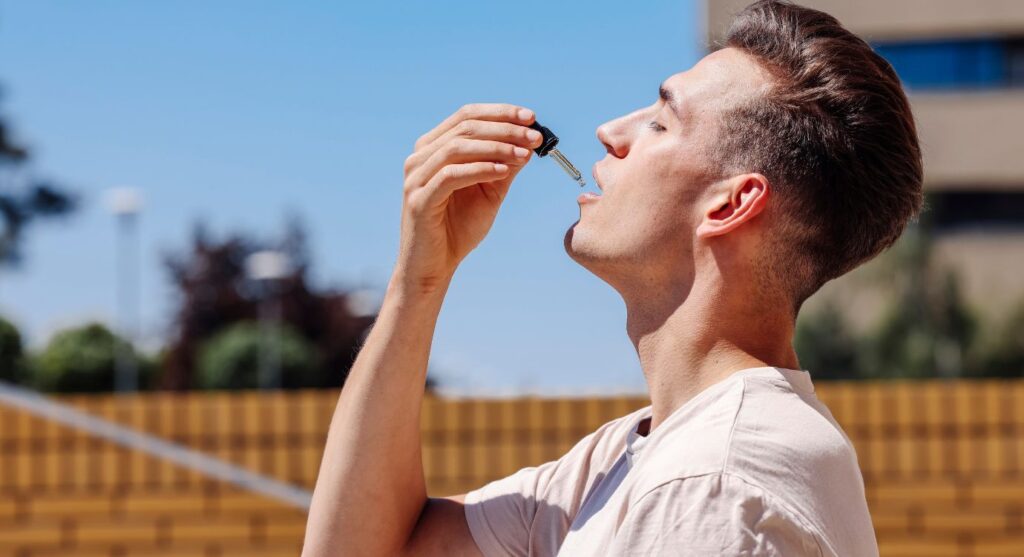Free delivery on all orders over £45
Free delivery on all orders over £45

Medically reviewed by
Are you struggling with a grumpy gut?
Irritable Bowel Syndrome can make your digestive system go haywire, causing discomfort and frustration.
But fear not, there is a potential hero in the battle again IBS: CBD oil.
While using CBD oil for IBS isn’t a recognised treatment, anecdotally, we know that many users turn to CBD oil to help them manage the symptoms of this chronic condition.
Sounds interesting? Read on, as in this article, we will discuss:
Let’s dive in….
CBD is one of many cannabinoids found in cannabis plants. CBD interacts with the endocannabinoid system, which maintains homeostasis throughout the body.
CBD oil is extracted from the leaves, stalks and flowers of commercial hemp plants, a low THC variety of the cannabis plant.
Since CBD does not contain THC – the psychoactive cannabinoid known to get users ‘high’ – taking CBD products will not alter a user’s mental state in any way.
Instead, early research suggests that CBD helps to support healthy bodily function by preventing the breakdown of anandamide, an endocannabinoid produced in the body.
Read more: CBD vs THC
10% off on your first order
Complete this one-minute quiz and find the right products for you.
Irritable bowel syndrome is a common condition which affects the digestive system.
It can lead to uncomfortable symptoms such as stomach cramps, bloating and diarrhoea. Other symptoms include fatigue, backache, incontinence and nausea.
While there is no test for IBS, other tests can be used to rule out other conditions.
IBS typically occurs in flare-ups, often triggered by stress or particular food and drink items.
This means those living with IBS may have good days and bad days with their symptoms. In addition, the unpredictability can make life with the condition more stressful.
The most common treatment for IBS in the UK is an elimination diet, which helps individuals learn about their triggers.
This includes switching to a diet rich in whole foods, cooking meals from scratch and avoiding trigger foods that are hard to digest, such as cabbage, broccoli, cauliflower, brussel sprouts, beans, onions and dried fruit.
Since IBS is considered an inflammatory condition, enjoying anti-inflammatory food and drink may also help.
Lifestyle changes can also help to control the symptoms. For example, IBS flare-ups may be related to stress, so finding ways to relax and get plenty of restful sleep will also help.
Read more: CBD for sleep

Let’s get it straight: CBD oil can’t cure IBS.
However, there is some evidence that CBD may bring modest benefits by helping ease the symptoms of IBS, but more studies are – as always – needed to reach any kind of clinical conclusion.
But we’re not just closing our eyes and crossing our fingers. IBS affects between 10 and 15 percent of Western populations, and research into the connection between IBS and the endocannabinoid system is ongoing.
While it’s not a relationship that is entirely understood, there have been some breakthroughs. IBS-D patients, for example (a subtype of the inflammatory condition), have been found to have genetic alterations which affect endocannabinoid metabolism.
Meanwhile, a growing body of thought suggests that IBS itself may be a dysfunction of the endocannabinoid system, manifesting as gastrointestinal issues.
This is important, as while CBD doesn’t cure IBS, it can potentially help regulate the endocannabinoid system (although we’re not quite sure how), thus helping maintain crucial homeostasis in the body.
In addition, CBD can also help support your overall health as you transition to a more active lifestyle.
Yes, CBD is typically very well tolerated in most people.
However, CBD may interact with other medications, so individuals must confirm if their medication is affected before adding CBD oil to their routine.
A report by The World Health Organisation determined that CBD does not have abuse or dependence potential. This means they do not believe that individuals can become addicted to CBD.
Read more: Is CBD oil addictive?
The report also determined that CBD has a good safety profile.
While CBD might come from the cannabis plant, it’s best to think of it as a botanical supplement. Just like certain trendy superfoods that have been popular in the past, CBD may be similar.
So while it shouldn’t be treated as a cure for anything, it could help some people manage symptoms of conditions such as IBS when used as part of a healthy lifestyle.

CBD is very easy to add to your daily routine.
For IBS, it can be taken in three ways:
However, when it comes to the best way to take CBD for IBS, we’d recommend oral ingestion.
Oral CBD may be taken as sublingual drops under the tongue, in a CBD capsule or even as a gummy sweet. However, since sugar and sweeteners may be a trigger for some people, gummy sweets may not be the best option.
Both tinctures (CBD oil drops) or CBD capsules will pass CBD down your oesophagus before releasing the cannabinoid into your stomach, delivering the supplement straight to your digestive tract.
CBD is also excellent as part of a mindfulness or meditation routine – both of which are associated with helping the anxiety and depression which often accompany conditions such as IBS.
Read more: CBD oil for anxiety
Adding a few drops of CBD oil under the tongue before meditating can help to give users something to focus on, particularly if you choose a flavoured CBD oil that contains additional cannabinoids and terpenes.
CBD can also support you in this journey if you are trying to manage your IBS by losing weight and getting more active. A CBD balm is the ideal post-workout pick-me-up to help ease aching muscles and joints (that’s why many athletes use CBD!)

Once again, we don’t quite have a definite answer.
There’s no established or recommended CBD dosage for IBS.
However, we always recommend going low and slow with CBD doses and working up to a quantity which feels right for you. New CBD users should begin with the minimum dose on a bottle and then slowly increase by 5-10ml increments as necessary.
With chronic conditions and pain, higher doses of CBD will likely work best in supporting overall wellness.
Read more: How to take CBD oil
When buying CBD for IBS, we’d always advise checking for the following:
While we have no definitive answers yet – and the evidence doesn’t indicate that CBD can be used as a treatment for IBS – scientists are continuing to investigate the possible benefits of CBD, and its potential to soothe inflammation, thus helping conditions such as IBS.
Of particular interest is the relationship between gastrointestinal issues and the ECS.
While further studies aim to connect these dots, we’d say that using CBD to support ECS function is an excellent way of promoting overall physical and psychological wellness.
Sign up for the Evopure newsletter:
This product is not for use by or sale to persons under the age of 18. It should not be used if you are pregnant or nursing. Consult with a physician before use if you have a serious medical condition or use prescription medications. A Doctor’s advice should be sought before using this and any supplemental dietary product. This product is not intended to diagnose, treat, cure or prevent any disease.
© Evopure Ltd. All rights reserved Terms & Conditions Cookie Policy Sitemap